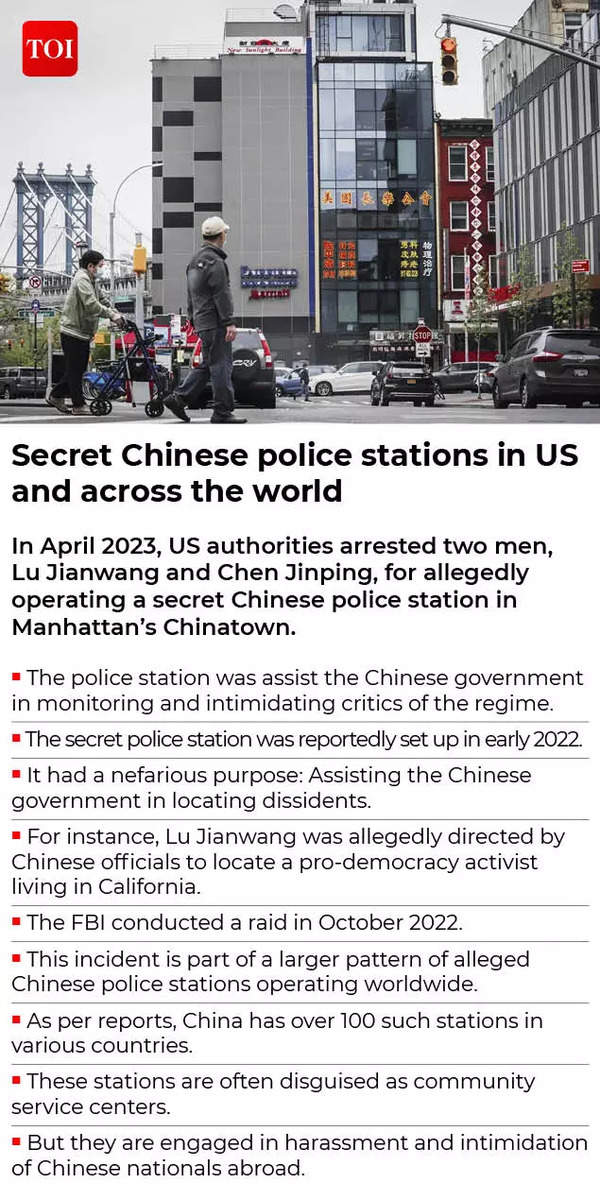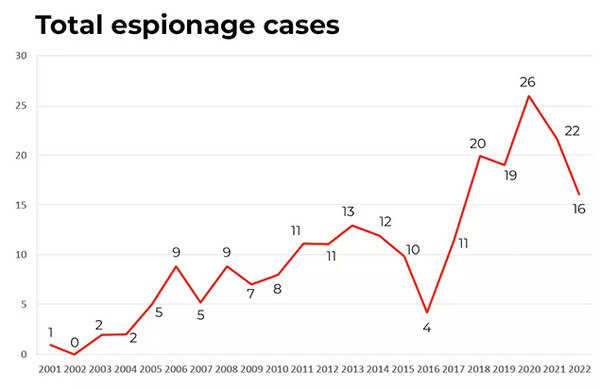
Driving the news
- Federal prosecutors have unveiled a stunning indictment against Linda Sun, accusing her of acting as an agent for the Chinese government.
- The indictment details how Sun, 40, leveraged her political position to secretly advance Chinese interests, blocking Taiwanese officials from meetings with state leaders and steering policy away from sensitive topics like human rights violations in China.
- Sun and Hu were charged with crimes including money laundering, visa fraud, and acting as unregistered agents of a foreign government.
- Both have pleaded not guilty.
Why it matters
The case highlights the growing concerns over China’s influence operations within the US, which include espionage, foreign lobbying, and secretive alliances.
In April 2023, Two individuals were taken into custody, accused of assisting in the creation of a covert law enforcement facility in New York City, allegedly operating under the direction of the Chinese government. In a separate development, approximately 36 members of China’s national police were charged with utilizing social media platforms to target and intimidate critics residing within the United States.

The department of justice has ramped up its efforts to root out covert Chinese agents, targeting individuals who help China advance its geopolitical goals on US soil.
Zoom in
- The indictment against Sun details years of clandestine activity.
- Pro-Taiwan measures obstructed: Prosecutors allege Sun blocked Taiwanese officials from meeting with state leaders and ensured that references to Taiwan and its plight were omitted from New York state communications.
- Uyghur issues silenced: She actively prevented state discussions regarding China’s treatment of Uyghurs, a Muslim minority group subject to persecution.
- Lavish benefits: In exchange for her covert work, Sun and her husband enjoyed a $3.6 million home on Long Island, a $1.9 million condo in Honolulu, and a 2024 Ferrari, among other perks.
- According to the indictment, Sun and her husband, Chris Hu, received millions in benefits, including luxury cars, real estate, and even gourmet Nanjing-style salted ducks delivered by a Chinese consulate chef.
- According to James Lewis, a researcher at the Center for Strategic and International Studies, someone of Sun’s stature would have been seen as a prime target for Beijing. “She was a good get,” Lewis told the New York Times, underscoring the significance of Sun’s political connections and access.
Between the lines
- Sun’s alleged involvement with China dates back to 2019 when she attended a reception in Beijing celebrating the 70th anniversary of the Chinese Communist Party. There, she was introduced as a representative of the US Asian American community, though she was actively working as an aide to Governor Cuomo at the time.
- Throughout her career, Sun worked closely with Asian American communities and Chinese organizations in Queens, New York. Her public role positioned her as a key figure in engaging the Chinese diaspora, but her hidden activities revealed deeper connections with Beijing.
- Her trip to China in 2019, prosecutors allege, was arranged and paid for by Chinese government officials, further cementing her relationship with Beijing’s elite. As the Covid-19 pandemic hit, she became part of a state team tasked with securing personal protective equipment from China, offering a prime opportunity for her to strengthen ties with Chinese officials.
What they’re saying
- Hochul expressed her outrage after the charges were made public. “I’m outraged by this behavior,” she said, emphasizing the betrayal of trust. Sun was fired in 2023 after Hochul’s office discovered evidence of misconduct and referred the matter to law enforcement.
- US attorney Breon Peace: “Sun wielded her position of influence among executives to covertly promote [Chinese] and [Chinese Communist Party] agendas, directly threatening our country’s national security.”
- Liu Pengyu, Chinese Embassy spokesperson: “China requires its citizens overseas to comply with the laws and regulations of the host country, and we firmly oppose the groundlessly slandering and smearing targeting China.”
Chinese espionage in US
- According to a Centre for Startegic and International Studie (CSIS) report, Since 2000, there have been at least 224 publicly reported instances of Chinese espionage directed at the US, with 69% occurring after
Xi Jinping took power in 2013. - The long-term cost to the US economy and national security is estimated to be in the billions of dollars.
- 49% of incidents involved direct participation by Chinese military or government officials.
- 41% of cases were tied to private Chinese citizens.
- 10% included non-Chinese individuals, often US citizens recruited by Chinese operatives.
- 46% of incidents centered on cyber espionage, typically conducted by state-linked actors.
- 29% of cases aimed at acquiring military technology.
- 54% sought commercial technological secrets.
- 17% targeted information on US civilian agencies or political figures.

What next
- Sun’s trial is expected to be closely watched, as it could reveal more about how China’s influence campaigns operate in the US. The Justice Department has indicated that this case is part of a broader crackdown on Chinese espionage and political interference.
- Sun’s lawyer, Jarrod Schaeffer, maintained her innocence, saying, “Our client is eager to exercise her right to a speedy trial and defend against these accusations.” The case underscores the significant legal challenges in prosecuting foreign influence cases, especially those involving complex networks of influence and covert activity.
- Sun’s indictment serves as a wake-up call about the extent of foreign influence operations in the US. While the case may seem isolated, it fits into a larger pattern of China’s attempts to covertly shape American policy through connections at every level of government.
- As the US continues to confront Chinese espionage and interference, cases like Sun’s reveal how such activities threaten not only national security but also public trust in democratic institutions.
(With inputs from agencies)





